BLO5540: Contract Law and Exclusion Clauses Assignment, Semester 1
VerifiedAdded on 2023/01/17
|12
|2728
|48
Homework Assignment
AI Summary
This assignment solution addresses key aspects of business and contract law, focusing on a case involving a café and a customer. Question 1(a) analyzes contract formation, including the elements of offer, acceptance, and consideration, referencing relevant case law like Pharmaceutical Society of Great Britain v Boots and Brogden v Metropolitan Railway. Question 1(b) examines the validity of an exclusion clause on a ticket, considering the rules for unsigned agreements and past dealings, as well as the application of the Australian Consumer Law (ACL) and the definition of a consumer. The solution concludes that while the café might argue for the clause's validity based on past dealings, the customer, as a consumer under ACL, has rights that may render the clause invalid. Question 2 delves into contract terms, differentiating between express and implied terms, and how they affect the obligations and liabilities of parties involved in a contract.

Running Head: BUSINESS AND CORPORATION LAW 0
Business and Company Law
BLO5540
5/8/2019
Student’s Name
Business and Company Law
BLO5540
5/8/2019
Student’s Name
Paraphrase This Document
Need a fresh take? Get an instant paraphrase of this document with our AI Paraphraser
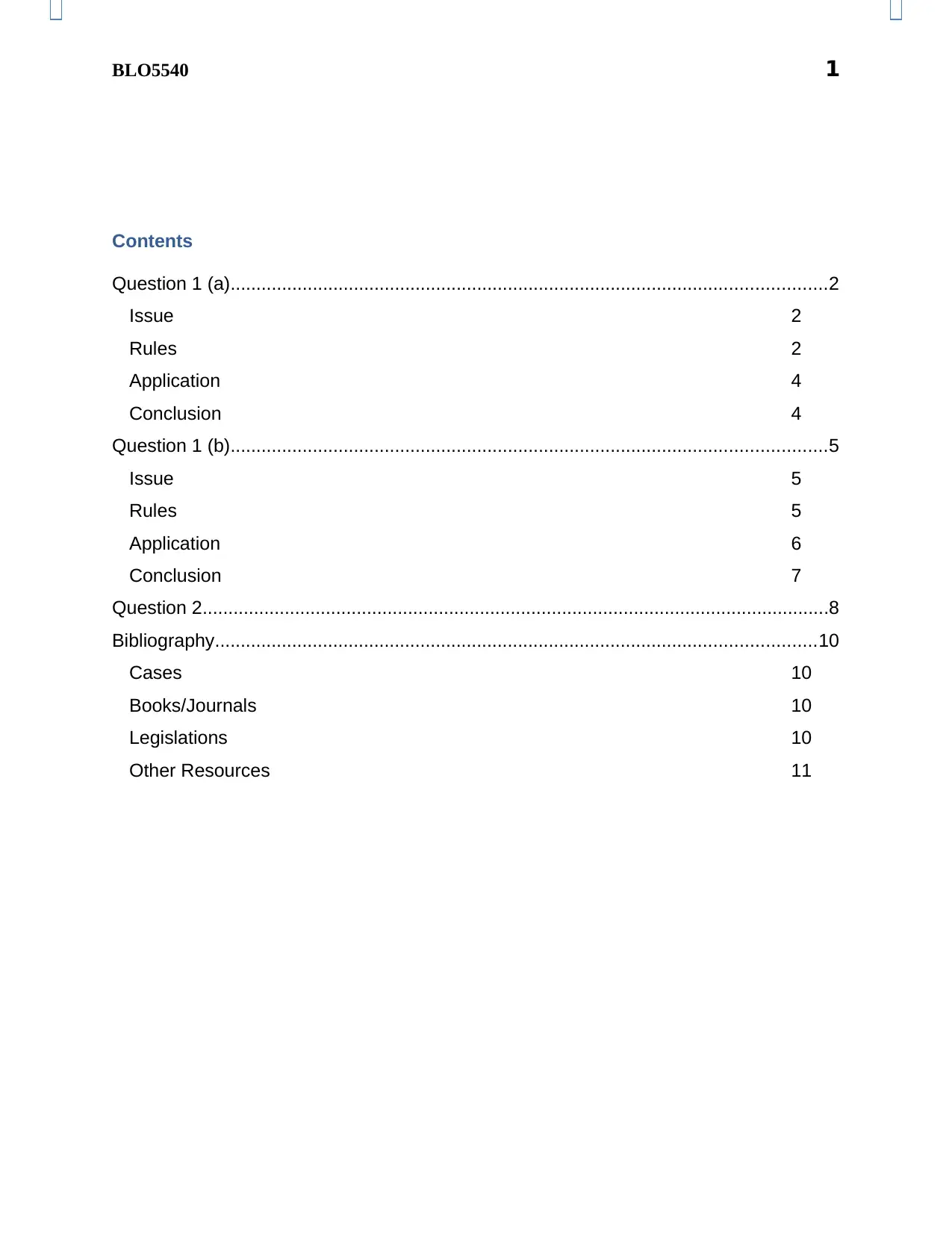
BLO5540 1
Contents
Question 1 (a)....................................................................................................................2
Issue 2
Rules 2
Application 4
Conclusion 4
Question 1 (b)....................................................................................................................5
Issue 5
Rules 5
Application 6
Conclusion 7
Question 2..........................................................................................................................8
Bibliography.....................................................................................................................10
Cases 10
Books/Journals 10
Legislations 10
Other Resources 11
Contents
Question 1 (a)....................................................................................................................2
Issue 2
Rules 2
Application 4
Conclusion 4
Question 1 (b)....................................................................................................................5
Issue 5
Rules 5
Application 6
Conclusion 7
Question 2..........................................................................................................................8
Bibliography.....................................................................................................................10
Cases 10
Books/Journals 10
Legislations 10
Other Resources 11
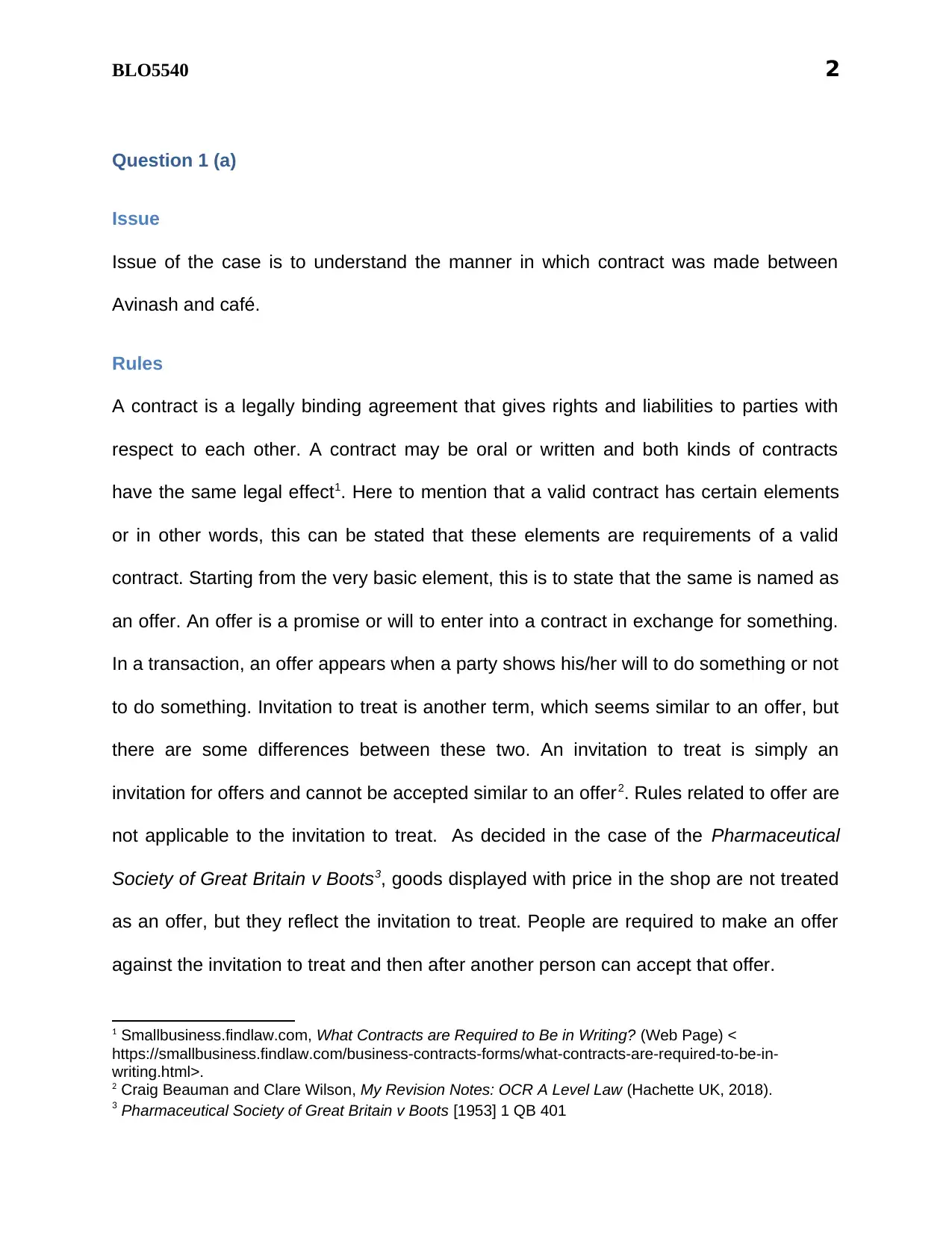
BLO5540 2
Question 1 (a)
Issue
Issue of the case is to understand the manner in which contract was made between
Avinash and café.
Rules
A contract is a legally binding agreement that gives rights and liabilities to parties with
respect to each other. A contract may be oral or written and both kinds of contracts
have the same legal effect1. Here to mention that a valid contract has certain elements
or in other words, this can be stated that these elements are requirements of a valid
contract. Starting from the very basic element, this is to state that the same is named as
an offer. An offer is a promise or will to enter into a contract in exchange for something.
In a transaction, an offer appears when a party shows his/her will to do something or not
to do something. Invitation to treat is another term, which seems similar to an offer, but
there are some differences between these two. An invitation to treat is simply an
invitation for offers and cannot be accepted similar to an offer2. Rules related to offer are
not applicable to the invitation to treat. As decided in the case of the Pharmaceutical
Society of Great Britain v Boots3, goods displayed with price in the shop are not treated
as an offer, but they reflect the invitation to treat. People are required to make an offer
against the invitation to treat and then after another person can accept that offer.
1 Smallbusiness.findlaw.com, What Contracts are Required to Be in Writing? (Web Page) <
https://smallbusiness.findlaw.com/business-contracts-forms/what-contracts-are-required-to-be-in-
writing.html>.
2 Craig Beauman and Clare Wilson, My Revision Notes: OCR A Level Law (Hachette UK, 2018).
3 Pharmaceutical Society of Great Britain v Boots [1953] 1 QB 401
Question 1 (a)
Issue
Issue of the case is to understand the manner in which contract was made between
Avinash and café.
Rules
A contract is a legally binding agreement that gives rights and liabilities to parties with
respect to each other. A contract may be oral or written and both kinds of contracts
have the same legal effect1. Here to mention that a valid contract has certain elements
or in other words, this can be stated that these elements are requirements of a valid
contract. Starting from the very basic element, this is to state that the same is named as
an offer. An offer is a promise or will to enter into a contract in exchange for something.
In a transaction, an offer appears when a party shows his/her will to do something or not
to do something. Invitation to treat is another term, which seems similar to an offer, but
there are some differences between these two. An invitation to treat is simply an
invitation for offers and cannot be accepted similar to an offer2. Rules related to offer are
not applicable to the invitation to treat. As decided in the case of the Pharmaceutical
Society of Great Britain v Boots3, goods displayed with price in the shop are not treated
as an offer, but they reflect the invitation to treat. People are required to make an offer
against the invitation to treat and then after another person can accept that offer.
1 Smallbusiness.findlaw.com, What Contracts are Required to Be in Writing? (Web Page) <
https://smallbusiness.findlaw.com/business-contracts-forms/what-contracts-are-required-to-be-in-
writing.html>.
2 Craig Beauman and Clare Wilson, My Revision Notes: OCR A Level Law (Hachette UK, 2018).
3 Pharmaceutical Society of Great Britain v Boots [1953] 1 QB 401
⊘ This is a preview!⊘
Do you want full access?
Subscribe today to unlock all pages.

Trusted by 1+ million students worldwide
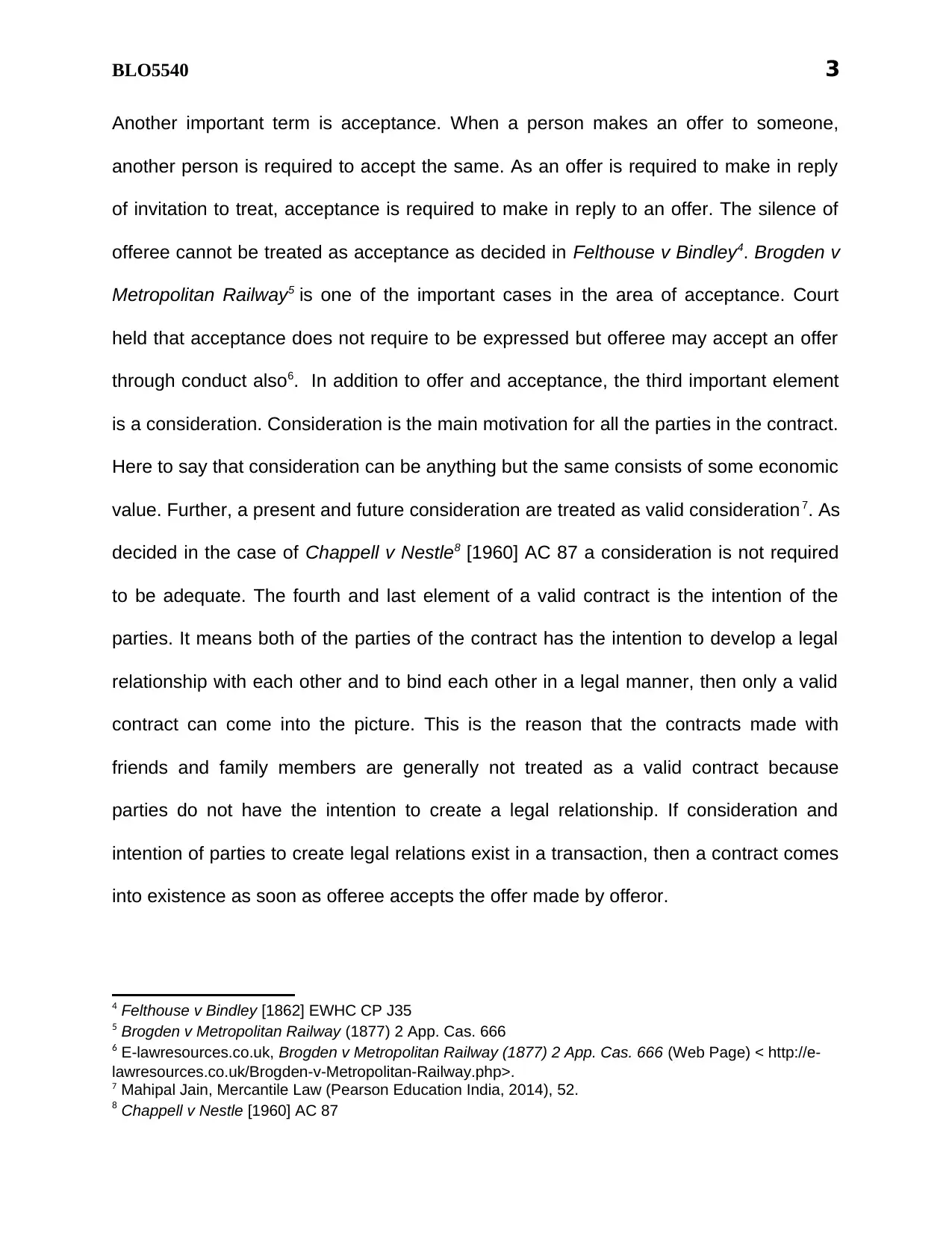
BLO5540 3
Another important term is acceptance. When a person makes an offer to someone,
another person is required to accept the same. As an offer is required to make in reply
of invitation to treat, acceptance is required to make in reply to an offer. The silence of
offeree cannot be treated as acceptance as decided in Felthouse v Bindley4. Brogden v
Metropolitan Railway5 is one of the important cases in the area of acceptance. Court
held that acceptance does not require to be expressed but offeree may accept an offer
through conduct also6. In addition to offer and acceptance, the third important element
is a consideration. Consideration is the main motivation for all the parties in the contract.
Here to say that consideration can be anything but the same consists of some economic
value. Further, a present and future consideration are treated as valid consideration 7. As
decided in the case of Chappell v Nestle8 [1960] AC 87 a consideration is not required
to be adequate. The fourth and last element of a valid contract is the intention of the
parties. It means both of the parties of the contract has the intention to develop a legal
relationship with each other and to bind each other in a legal manner, then only a valid
contract can come into the picture. This is the reason that the contracts made with
friends and family members are generally not treated as a valid contract because
parties do not have the intention to create a legal relationship. If consideration and
intention of parties to create legal relations exist in a transaction, then a contract comes
into existence as soon as offeree accepts the offer made by offeror.
4 Felthouse v Bindley [1862] EWHC CP J35
5 Brogden v Metropolitan Railway (1877) 2 App. Cas. 666
6 E-lawresources.co.uk, Brogden v Metropolitan Railway (1877) 2 App. Cas. 666 (Web Page) < http://e-
lawresources.co.uk/Brogden-v-Metropolitan-Railway.php>.
7 Mahipal Jain, Mercantile Law (Pearson Education India, 2014), 52.
8 Chappell v Nestle [1960] AC 87
Another important term is acceptance. When a person makes an offer to someone,
another person is required to accept the same. As an offer is required to make in reply
of invitation to treat, acceptance is required to make in reply to an offer. The silence of
offeree cannot be treated as acceptance as decided in Felthouse v Bindley4. Brogden v
Metropolitan Railway5 is one of the important cases in the area of acceptance. Court
held that acceptance does not require to be expressed but offeree may accept an offer
through conduct also6. In addition to offer and acceptance, the third important element
is a consideration. Consideration is the main motivation for all the parties in the contract.
Here to say that consideration can be anything but the same consists of some economic
value. Further, a present and future consideration are treated as valid consideration 7. As
decided in the case of Chappell v Nestle8 [1960] AC 87 a consideration is not required
to be adequate. The fourth and last element of a valid contract is the intention of the
parties. It means both of the parties of the contract has the intention to develop a legal
relationship with each other and to bind each other in a legal manner, then only a valid
contract can come into the picture. This is the reason that the contracts made with
friends and family members are generally not treated as a valid contract because
parties do not have the intention to create a legal relationship. If consideration and
intention of parties to create legal relations exist in a transaction, then a contract comes
into existence as soon as offeree accepts the offer made by offeror.
4 Felthouse v Bindley [1862] EWHC CP J35
5 Brogden v Metropolitan Railway (1877) 2 App. Cas. 666
6 E-lawresources.co.uk, Brogden v Metropolitan Railway (1877) 2 App. Cas. 666 (Web Page) < http://e-
lawresources.co.uk/Brogden-v-Metropolitan-Railway.php>.
7 Mahipal Jain, Mercantile Law (Pearson Education India, 2014), 52.
8 Chappell v Nestle [1960] AC 87
Paraphrase This Document
Need a fresh take? Get an instant paraphrase of this document with our AI Paraphraser
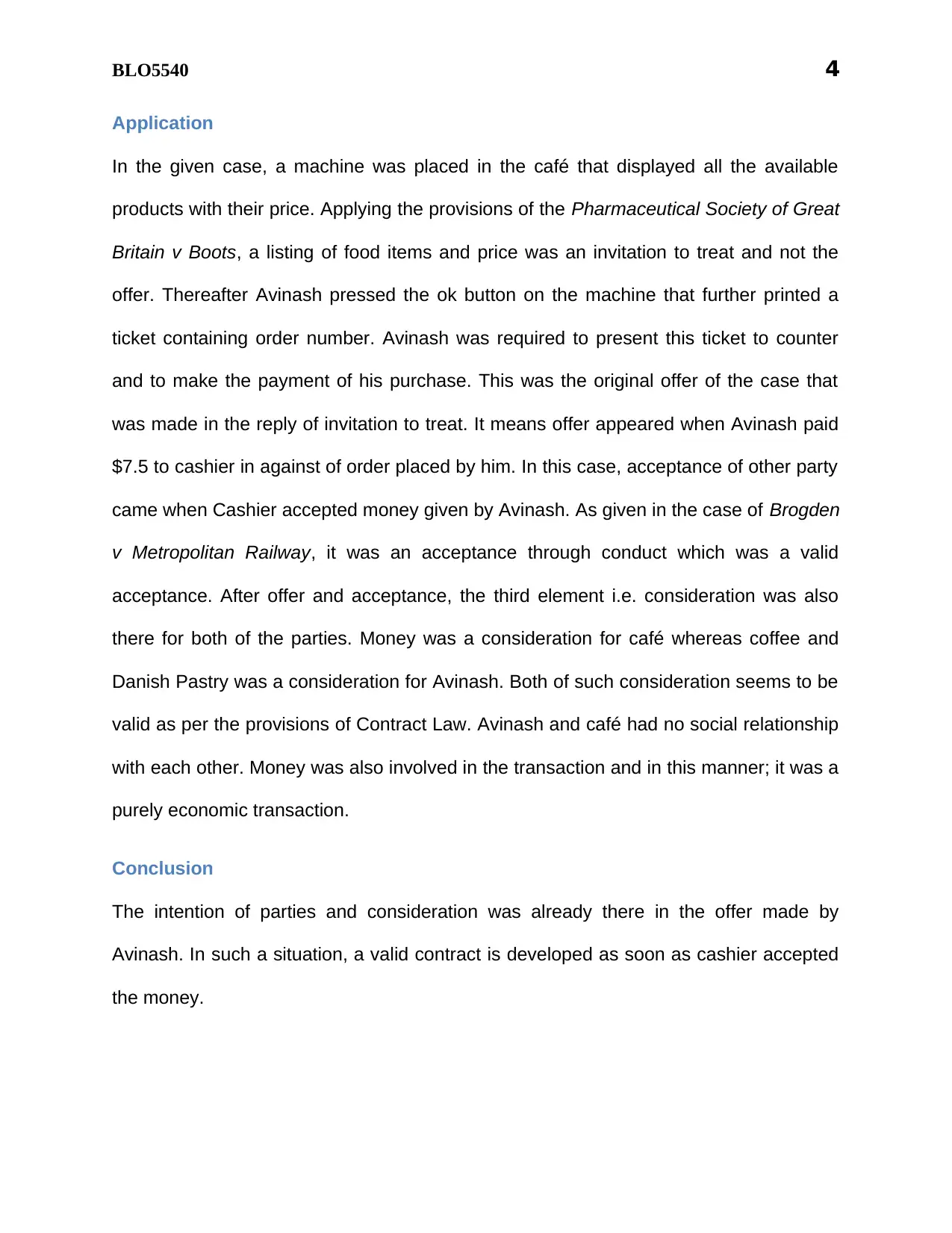
BLO5540 4
Application
In the given case, a machine was placed in the café that displayed all the available
products with their price. Applying the provisions of the Pharmaceutical Society of Great
Britain v Boots, a listing of food items and price was an invitation to treat and not the
offer. Thereafter Avinash pressed the ok button on the machine that further printed a
ticket containing order number. Avinash was required to present this ticket to counter
and to make the payment of his purchase. This was the original offer of the case that
was made in the reply of invitation to treat. It means offer appeared when Avinash paid
$7.5 to cashier in against of order placed by him. In this case, acceptance of other party
came when Cashier accepted money given by Avinash. As given in the case of Brogden
v Metropolitan Railway, it was an acceptance through conduct which was a valid
acceptance. After offer and acceptance, the third element i.e. consideration was also
there for both of the parties. Money was a consideration for café whereas coffee and
Danish Pastry was a consideration for Avinash. Both of such consideration seems to be
valid as per the provisions of Contract Law. Avinash and café had no social relationship
with each other. Money was also involved in the transaction and in this manner; it was a
purely economic transaction.
Conclusion
The intention of parties and consideration was already there in the offer made by
Avinash. In such a situation, a valid contract is developed as soon as cashier accepted
the money.
Application
In the given case, a machine was placed in the café that displayed all the available
products with their price. Applying the provisions of the Pharmaceutical Society of Great
Britain v Boots, a listing of food items and price was an invitation to treat and not the
offer. Thereafter Avinash pressed the ok button on the machine that further printed a
ticket containing order number. Avinash was required to present this ticket to counter
and to make the payment of his purchase. This was the original offer of the case that
was made in the reply of invitation to treat. It means offer appeared when Avinash paid
$7.5 to cashier in against of order placed by him. In this case, acceptance of other party
came when Cashier accepted money given by Avinash. As given in the case of Brogden
v Metropolitan Railway, it was an acceptance through conduct which was a valid
acceptance. After offer and acceptance, the third element i.e. consideration was also
there for both of the parties. Money was a consideration for café whereas coffee and
Danish Pastry was a consideration for Avinash. Both of such consideration seems to be
valid as per the provisions of Contract Law. Avinash and café had no social relationship
with each other. Money was also involved in the transaction and in this manner; it was a
purely economic transaction.
Conclusion
The intention of parties and consideration was already there in the offer made by
Avinash. In such a situation, a valid contract is developed as soon as cashier accepted
the money.
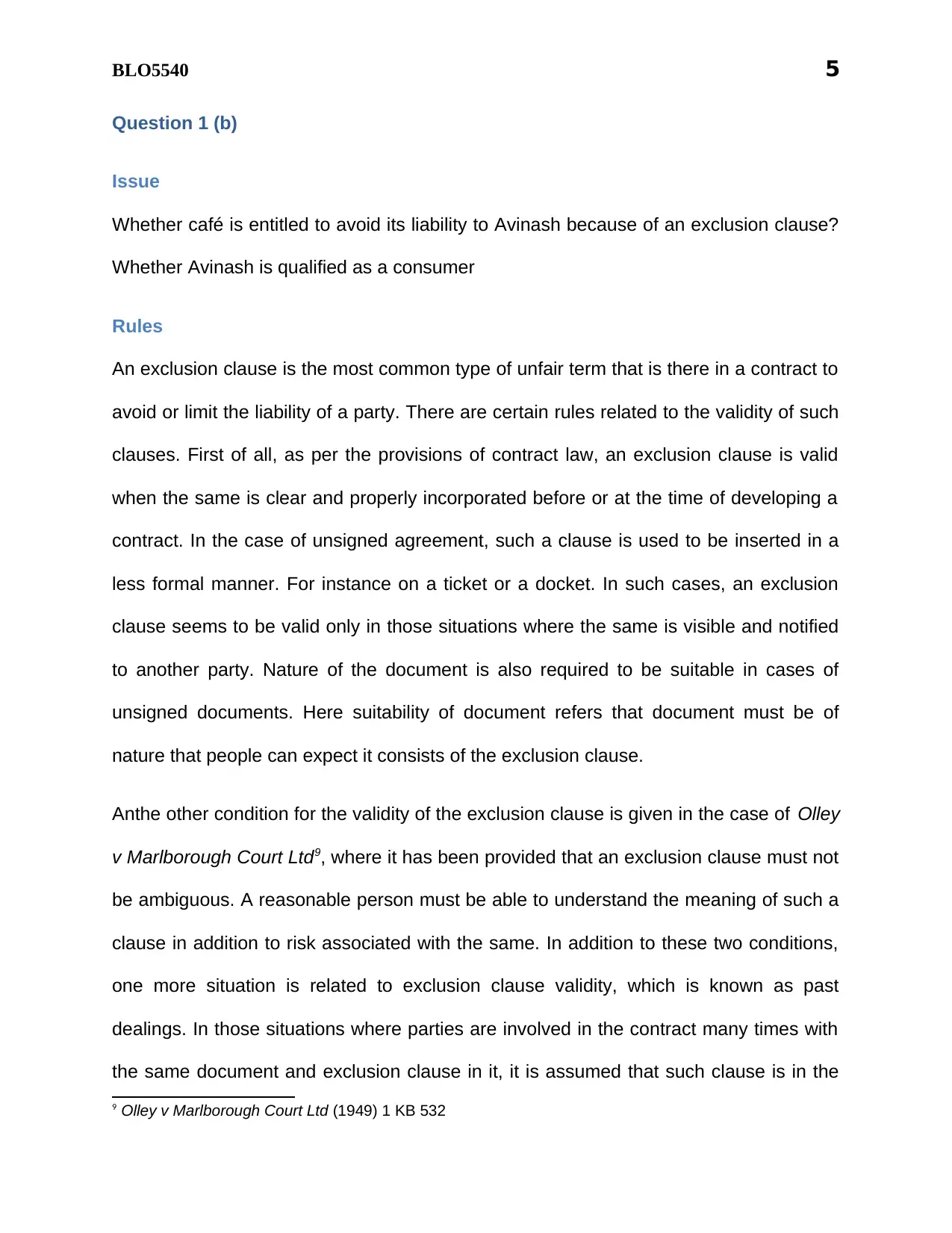
BLO5540 5
Question 1 (b)
Issue
Whether café is entitled to avoid its liability to Avinash because of an exclusion clause?
Whether Avinash is qualified as a consumer
Rules
An exclusion clause is the most common type of unfair term that is there in a contract to
avoid or limit the liability of a party. There are certain rules related to the validity of such
clauses. First of all, as per the provisions of contract law, an exclusion clause is valid
when the same is clear and properly incorporated before or at the time of developing a
contract. In the case of unsigned agreement, such a clause is used to be inserted in a
less formal manner. For instance on a ticket or a docket. In such cases, an exclusion
clause seems to be valid only in those situations where the same is visible and notified
to another party. Nature of the document is also required to be suitable in cases of
unsigned documents. Here suitability of document refers that document must be of
nature that people can expect it consists of the exclusion clause.
Anthe other condition for the validity of the exclusion clause is given in the case of Olley
v Marlborough Court Ltd9, where it has been provided that an exclusion clause must not
be ambiguous. A reasonable person must be able to understand the meaning of such a
clause in addition to risk associated with the same. In addition to these two conditions,
one more situation is related to exclusion clause validity, which is known as past
dealings. In those situations where parties are involved in the contract many times with
the same document and exclusion clause in it, it is assumed that such clause is in the
9 Olley v Marlborough Court Ltd (1949) 1 KB 532
Question 1 (b)
Issue
Whether café is entitled to avoid its liability to Avinash because of an exclusion clause?
Whether Avinash is qualified as a consumer
Rules
An exclusion clause is the most common type of unfair term that is there in a contract to
avoid or limit the liability of a party. There are certain rules related to the validity of such
clauses. First of all, as per the provisions of contract law, an exclusion clause is valid
when the same is clear and properly incorporated before or at the time of developing a
contract. In the case of unsigned agreement, such a clause is used to be inserted in a
less formal manner. For instance on a ticket or a docket. In such cases, an exclusion
clause seems to be valid only in those situations where the same is visible and notified
to another party. Nature of the document is also required to be suitable in cases of
unsigned documents. Here suitability of document refers that document must be of
nature that people can expect it consists of the exclusion clause.
Anthe other condition for the validity of the exclusion clause is given in the case of Olley
v Marlborough Court Ltd9, where it has been provided that an exclusion clause must not
be ambiguous. A reasonable person must be able to understand the meaning of such a
clause in addition to risk associated with the same. In addition to these two conditions,
one more situation is related to exclusion clause validity, which is known as past
dealings. In those situations where parties are involved in the contract many times with
the same document and exclusion clause in it, it is assumed that such clause is in the
9 Olley v Marlborough Court Ltd (1949) 1 KB 532
⊘ This is a preview!⊘
Do you want full access?
Subscribe today to unlock all pages.

Trusted by 1+ million students worldwide
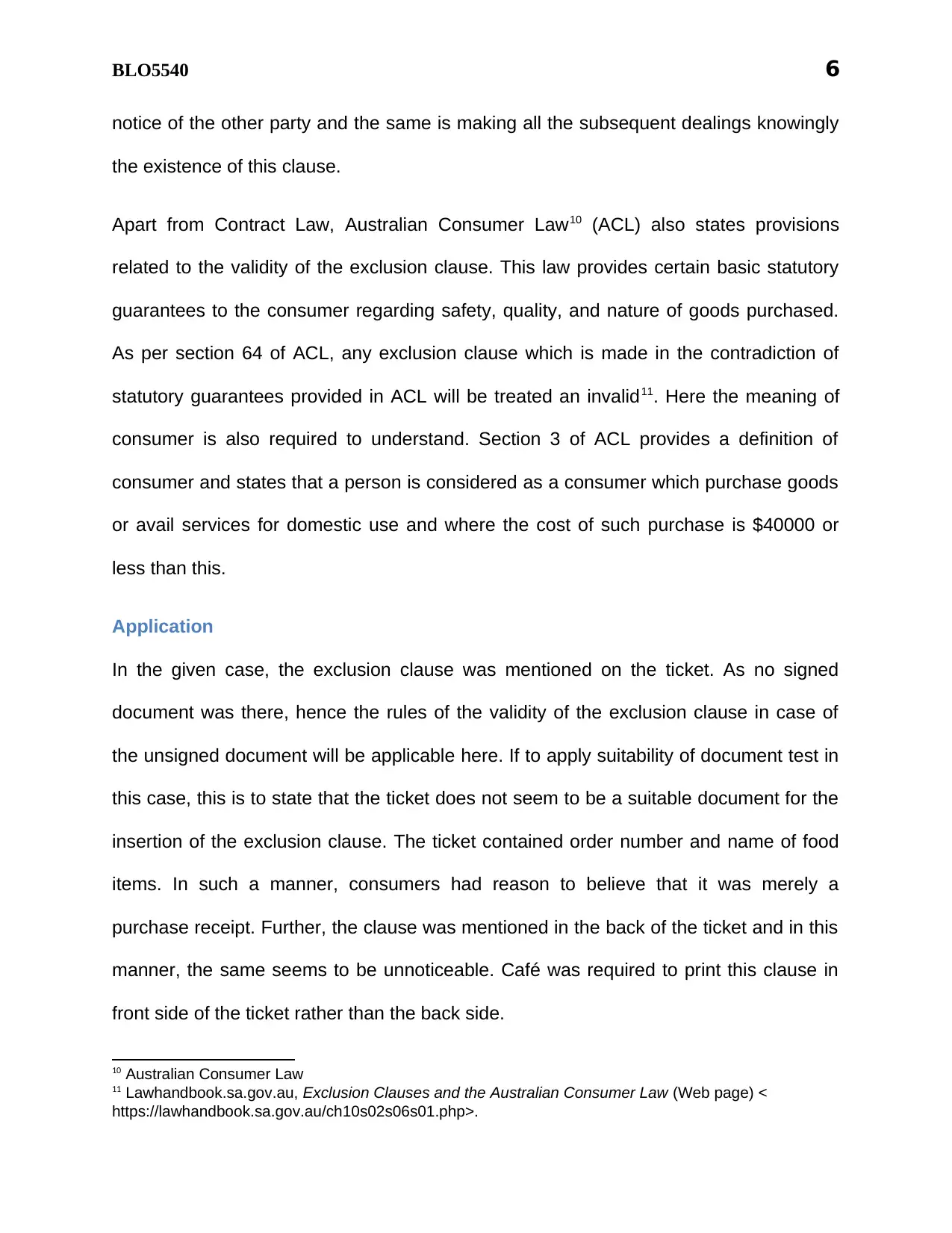
BLO5540 6
notice of the other party and the same is making all the subsequent dealings knowingly
the existence of this clause.
Apart from Contract Law, Australian Consumer Law10 (ACL) also states provisions
related to the validity of the exclusion clause. This law provides certain basic statutory
guarantees to the consumer regarding safety, quality, and nature of goods purchased.
As per section 64 of ACL, any exclusion clause which is made in the contradiction of
statutory guarantees provided in ACL will be treated an invalid11. Here the meaning of
consumer is also required to understand. Section 3 of ACL provides a definition of
consumer and states that a person is considered as a consumer which purchase goods
or avail services for domestic use and where the cost of such purchase is $40000 or
less than this.
Application
In the given case, the exclusion clause was mentioned on the ticket. As no signed
document was there, hence the rules of the validity of the exclusion clause in case of
the unsigned document will be applicable here. If to apply suitability of document test in
this case, this is to state that the ticket does not seem to be a suitable document for the
insertion of the exclusion clause. The ticket contained order number and name of food
items. In such a manner, consumers had reason to believe that it was merely a
purchase receipt. Further, the clause was mentioned in the back of the ticket and in this
manner, the same seems to be unnoticeable. Café was required to print this clause in
front side of the ticket rather than the back side.
10 Australian Consumer Law
11 Lawhandbook.sa.gov.au, Exclusion Clauses and the Australian Consumer Law (Web page) <
https://lawhandbook.sa.gov.au/ch10s02s06s01.php>.
notice of the other party and the same is making all the subsequent dealings knowingly
the existence of this clause.
Apart from Contract Law, Australian Consumer Law10 (ACL) also states provisions
related to the validity of the exclusion clause. This law provides certain basic statutory
guarantees to the consumer regarding safety, quality, and nature of goods purchased.
As per section 64 of ACL, any exclusion clause which is made in the contradiction of
statutory guarantees provided in ACL will be treated an invalid11. Here the meaning of
consumer is also required to understand. Section 3 of ACL provides a definition of
consumer and states that a person is considered as a consumer which purchase goods
or avail services for domestic use and where the cost of such purchase is $40000 or
less than this.
Application
In the given case, the exclusion clause was mentioned on the ticket. As no signed
document was there, hence the rules of the validity of the exclusion clause in case of
the unsigned document will be applicable here. If to apply suitability of document test in
this case, this is to state that the ticket does not seem to be a suitable document for the
insertion of the exclusion clause. The ticket contained order number and name of food
items. In such a manner, consumers had reason to believe that it was merely a
purchase receipt. Further, the clause was mentioned in the back of the ticket and in this
manner, the same seems to be unnoticeable. Café was required to print this clause in
front side of the ticket rather than the back side.
10 Australian Consumer Law
11 Lawhandbook.sa.gov.au, Exclusion Clauses and the Australian Consumer Law (Web page) <
https://lawhandbook.sa.gov.au/ch10s02s06s01.php>.
Paraphrase This Document
Need a fresh take? Get an instant paraphrase of this document with our AI Paraphraser
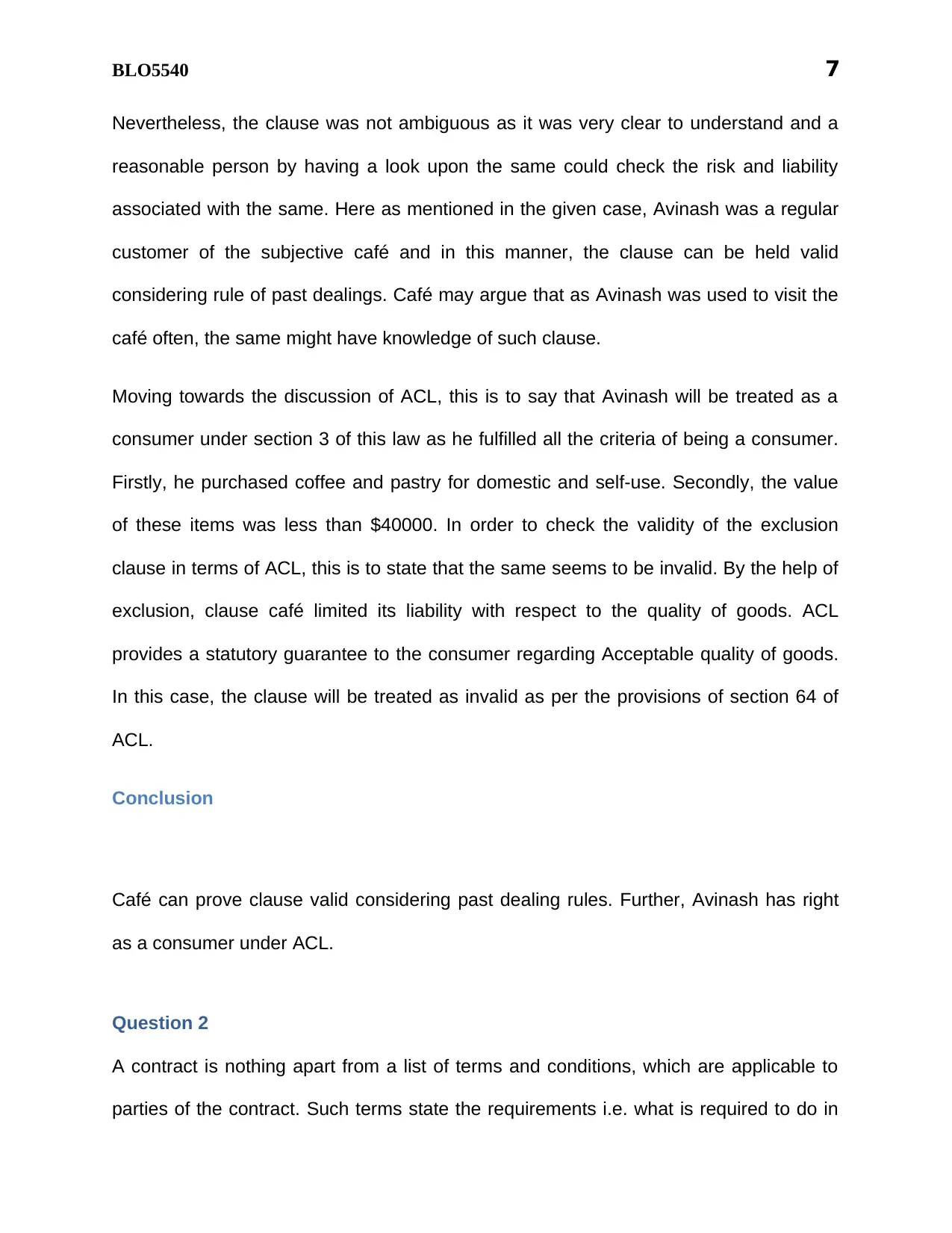
BLO5540 7
Nevertheless, the clause was not ambiguous as it was very clear to understand and a
reasonable person by having a look upon the same could check the risk and liability
associated with the same. Here as mentioned in the given case, Avinash was a regular
customer of the subjective café and in this manner, the clause can be held valid
considering rule of past dealings. Café may argue that as Avinash was used to visit the
café often, the same might have knowledge of such clause.
Moving towards the discussion of ACL, this is to say that Avinash will be treated as a
consumer under section 3 of this law as he fulfilled all the criteria of being a consumer.
Firstly, he purchased coffee and pastry for domestic and self-use. Secondly, the value
of these items was less than $40000. In order to check the validity of the exclusion
clause in terms of ACL, this is to state that the same seems to be invalid. By the help of
exclusion, clause café limited its liability with respect to the quality of goods. ACL
provides a statutory guarantee to the consumer regarding Acceptable quality of goods.
In this case, the clause will be treated as invalid as per the provisions of section 64 of
ACL.
Conclusion
Café can prove clause valid considering past dealing rules. Further, Avinash has right
as a consumer under ACL.
Question 2
A contract is nothing apart from a list of terms and conditions, which are applicable to
parties of the contract. Such terms state the requirements i.e. what is required to do in
Nevertheless, the clause was not ambiguous as it was very clear to understand and a
reasonable person by having a look upon the same could check the risk and liability
associated with the same. Here as mentioned in the given case, Avinash was a regular
customer of the subjective café and in this manner, the clause can be held valid
considering rule of past dealings. Café may argue that as Avinash was used to visit the
café often, the same might have knowledge of such clause.
Moving towards the discussion of ACL, this is to say that Avinash will be treated as a
consumer under section 3 of this law as he fulfilled all the criteria of being a consumer.
Firstly, he purchased coffee and pastry for domestic and self-use. Secondly, the value
of these items was less than $40000. In order to check the validity of the exclusion
clause in terms of ACL, this is to state that the same seems to be invalid. By the help of
exclusion, clause café limited its liability with respect to the quality of goods. ACL
provides a statutory guarantee to the consumer regarding Acceptable quality of goods.
In this case, the clause will be treated as invalid as per the provisions of section 64 of
ACL.
Conclusion
Café can prove clause valid considering past dealing rules. Further, Avinash has right
as a consumer under ACL.
Question 2
A contract is nothing apart from a list of terms and conditions, which are applicable to
parties of the contract. Such terms state the requirements i.e. what is required to do in
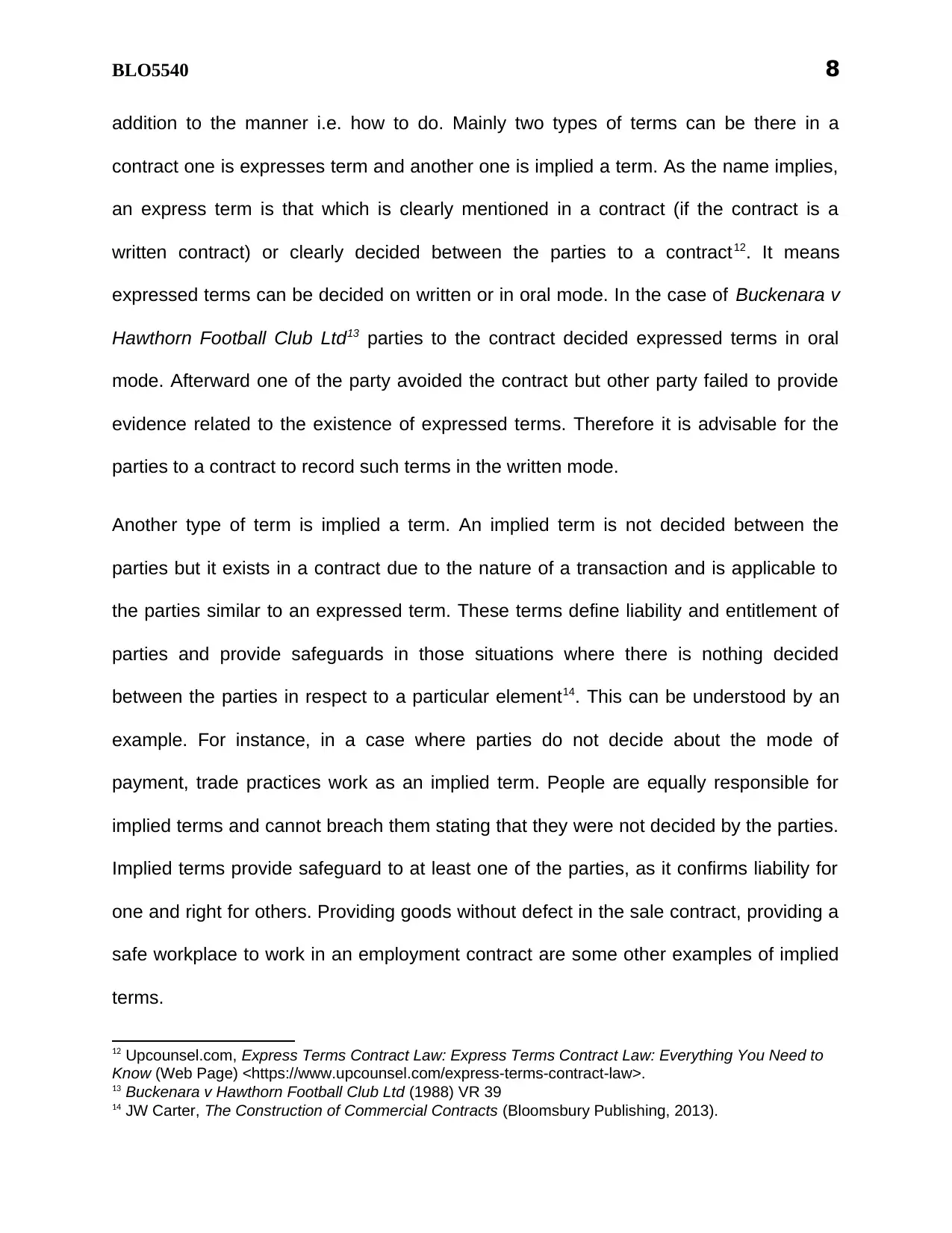
BLO5540 8
addition to the manner i.e. how to do. Mainly two types of terms can be there in a
contract one is expresses term and another one is implied a term. As the name implies,
an express term is that which is clearly mentioned in a contract (if the contract is a
written contract) or clearly decided between the parties to a contract12. It means
expressed terms can be decided on written or in oral mode. In the case of Buckenara v
Hawthorn Football Club Ltd13 parties to the contract decided expressed terms in oral
mode. Afterward one of the party avoided the contract but other party failed to provide
evidence related to the existence of expressed terms. Therefore it is advisable for the
parties to a contract to record such terms in the written mode.
Another type of term is implied a term. An implied term is not decided between the
parties but it exists in a contract due to the nature of a transaction and is applicable to
the parties similar to an expressed term. These terms define liability and entitlement of
parties and provide safeguards in those situations where there is nothing decided
between the parties in respect to a particular element14. This can be understood by an
example. For instance, in a case where parties do not decide about the mode of
payment, trade practices work as an implied term. People are equally responsible for
implied terms and cannot breach them stating that they were not decided by the parties.
Implied terms provide safeguard to at least one of the parties, as it confirms liability for
one and right for others. Providing goods without defect in the sale contract, providing a
safe workplace to work in an employment contract are some other examples of implied
terms.
12 Upcounsel.com, Express Terms Contract Law: Express Terms Contract Law: Everything You Need to
Know (Web Page) <https://www.upcounsel.com/express-terms-contract-law>.
13 Buckenara v Hawthorn Football Club Ltd (1988) VR 39
14 JW Carter, The Construction of Commercial Contracts (Bloomsbury Publishing, 2013).
addition to the manner i.e. how to do. Mainly two types of terms can be there in a
contract one is expresses term and another one is implied a term. As the name implies,
an express term is that which is clearly mentioned in a contract (if the contract is a
written contract) or clearly decided between the parties to a contract12. It means
expressed terms can be decided on written or in oral mode. In the case of Buckenara v
Hawthorn Football Club Ltd13 parties to the contract decided expressed terms in oral
mode. Afterward one of the party avoided the contract but other party failed to provide
evidence related to the existence of expressed terms. Therefore it is advisable for the
parties to a contract to record such terms in the written mode.
Another type of term is implied a term. An implied term is not decided between the
parties but it exists in a contract due to the nature of a transaction and is applicable to
the parties similar to an expressed term. These terms define liability and entitlement of
parties and provide safeguards in those situations where there is nothing decided
between the parties in respect to a particular element14. This can be understood by an
example. For instance, in a case where parties do not decide about the mode of
payment, trade practices work as an implied term. People are equally responsible for
implied terms and cannot breach them stating that they were not decided by the parties.
Implied terms provide safeguard to at least one of the parties, as it confirms liability for
one and right for others. Providing goods without defect in the sale contract, providing a
safe workplace to work in an employment contract are some other examples of implied
terms.
12 Upcounsel.com, Express Terms Contract Law: Express Terms Contract Law: Everything You Need to
Know (Web Page) <https://www.upcounsel.com/express-terms-contract-law>.
13 Buckenara v Hawthorn Football Club Ltd (1988) VR 39
14 JW Carter, The Construction of Commercial Contracts (Bloomsbury Publishing, 2013).
⊘ This is a preview!⊘
Do you want full access?
Subscribe today to unlock all pages.

Trusted by 1+ million students worldwide
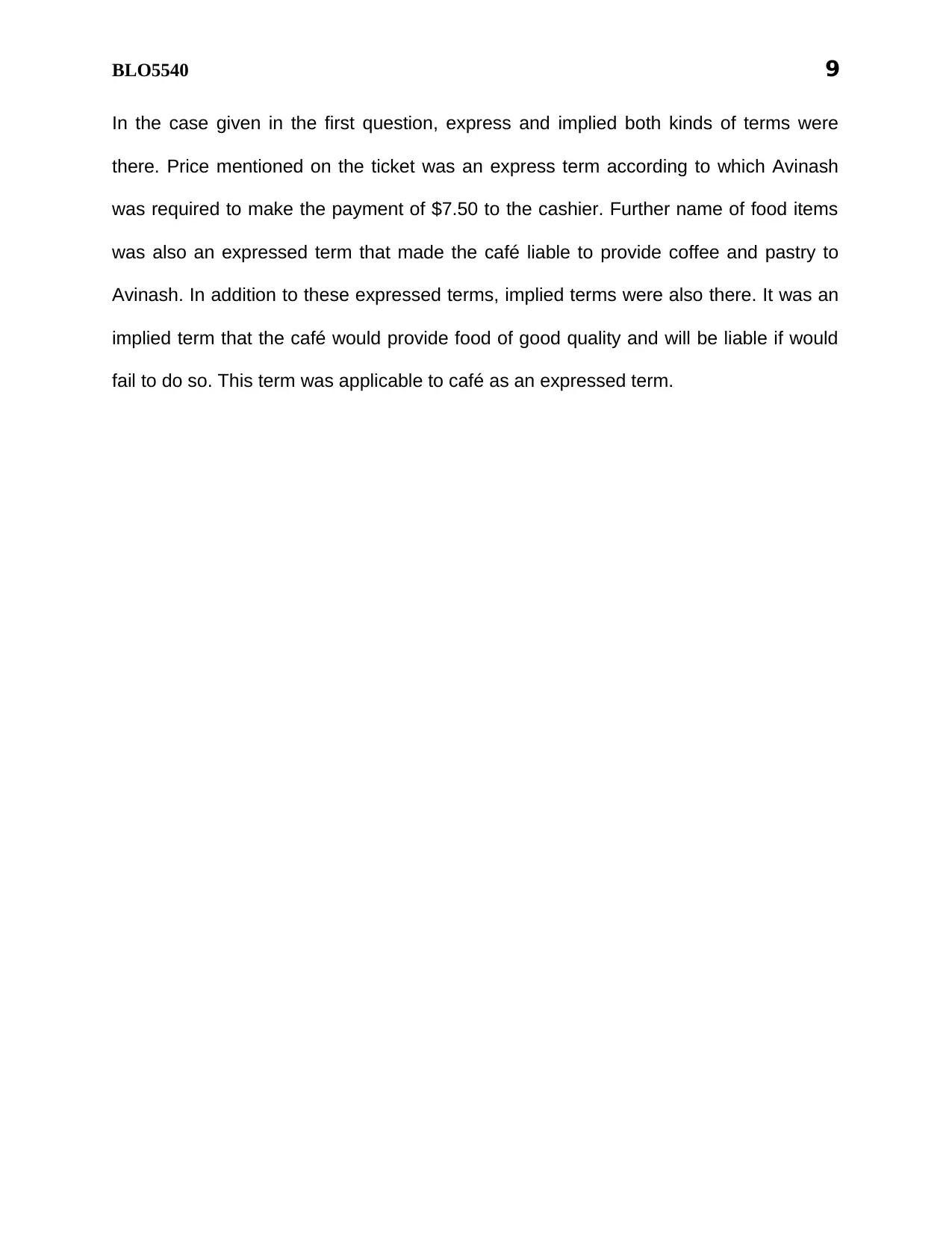
BLO5540 9
In the case given in the first question, express and implied both kinds of terms were
there. Price mentioned on the ticket was an express term according to which Avinash
was required to make the payment of $7.50 to the cashier. Further name of food items
was also an expressed term that made the café liable to provide coffee and pastry to
Avinash. In addition to these expressed terms, implied terms were also there. It was an
implied term that the café would provide food of good quality and will be liable if would
fail to do so. This term was applicable to café as an expressed term.
In the case given in the first question, express and implied both kinds of terms were
there. Price mentioned on the ticket was an express term according to which Avinash
was required to make the payment of $7.50 to the cashier. Further name of food items
was also an expressed term that made the café liable to provide coffee and pastry to
Avinash. In addition to these expressed terms, implied terms were also there. It was an
implied term that the café would provide food of good quality and will be liable if would
fail to do so. This term was applicable to café as an expressed term.
Paraphrase This Document
Need a fresh take? Get an instant paraphrase of this document with our AI Paraphraser
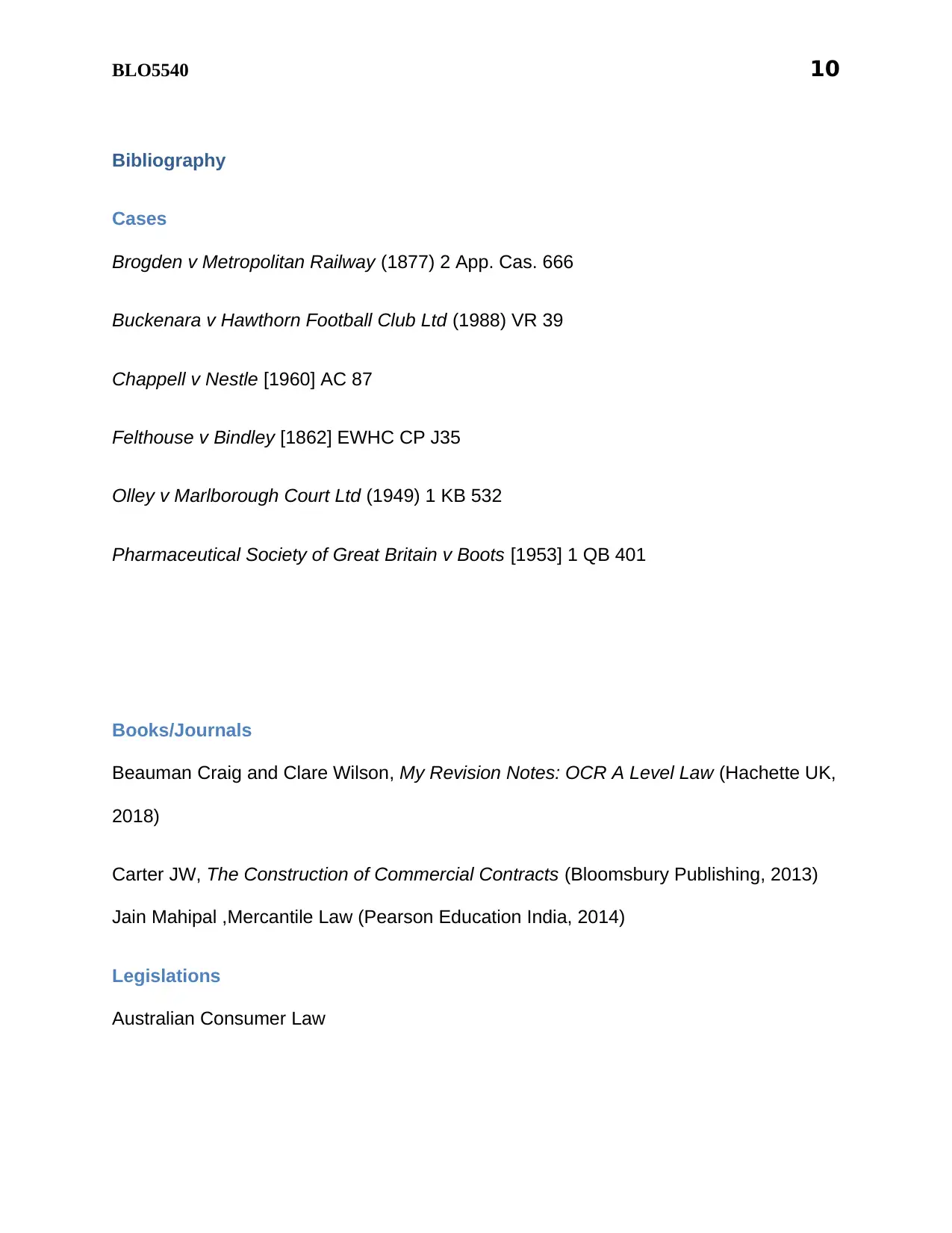
BLO5540 10
Bibliography
Cases
Brogden v Metropolitan Railway (1877) 2 App. Cas. 666
Buckenara v Hawthorn Football Club Ltd (1988) VR 39
Chappell v Nestle [1960] AC 87
Felthouse v Bindley [1862] EWHC CP J35
Olley v Marlborough Court Ltd (1949) 1 KB 532
Pharmaceutical Society of Great Britain v Boots [1953] 1 QB 401
Books/Journals
Beauman Craig and Clare Wilson, My Revision Notes: OCR A Level Law (Hachette UK,
2018)
Carter JW, The Construction of Commercial Contracts (Bloomsbury Publishing, 2013)
Jain Mahipal ,Mercantile Law (Pearson Education India, 2014)
Legislations
Australian Consumer Law
Bibliography
Cases
Brogden v Metropolitan Railway (1877) 2 App. Cas. 666
Buckenara v Hawthorn Football Club Ltd (1988) VR 39
Chappell v Nestle [1960] AC 87
Felthouse v Bindley [1862] EWHC CP J35
Olley v Marlborough Court Ltd (1949) 1 KB 532
Pharmaceutical Society of Great Britain v Boots [1953] 1 QB 401
Books/Journals
Beauman Craig and Clare Wilson, My Revision Notes: OCR A Level Law (Hachette UK,
2018)
Carter JW, The Construction of Commercial Contracts (Bloomsbury Publishing, 2013)
Jain Mahipal ,Mercantile Law (Pearson Education India, 2014)
Legislations
Australian Consumer Law

BLO5540 11
Other Resources
E-lawresources.co.uk, Brogden v Metropolitan Railway (1877) 2 App. Cas. 666 (Web
Page) < http://e-lawresources.co.uk/Brogden-v-Metropolitan-Railway.php>
Lawhandbook.sa.gov.au, Exclusion Clauses and the Australian Consumer Law (Web
page) < https://lawhandbook.sa.gov.au/ch10s02s06s01.php>
Smallbusiness.findlaw.com, What Contracts are Required to Be in Writing? (Web Page)
< https://smallbusiness.findlaw.com/business-contracts-forms/what-contracts-are-
required-to-be-in-writing.html>
Upcounsel.com, Express Terms Contract Law: Express Terms Contract Law:
Everything You Need to Know (Web Page) <https://www.upcounsel.com/express-terms-
contract-law>
Other Resources
E-lawresources.co.uk, Brogden v Metropolitan Railway (1877) 2 App. Cas. 666 (Web
Page) < http://e-lawresources.co.uk/Brogden-v-Metropolitan-Railway.php>
Lawhandbook.sa.gov.au, Exclusion Clauses and the Australian Consumer Law (Web
page) < https://lawhandbook.sa.gov.au/ch10s02s06s01.php>
Smallbusiness.findlaw.com, What Contracts are Required to Be in Writing? (Web Page)
< https://smallbusiness.findlaw.com/business-contracts-forms/what-contracts-are-
required-to-be-in-writing.html>
Upcounsel.com, Express Terms Contract Law: Express Terms Contract Law:
Everything You Need to Know (Web Page) <https://www.upcounsel.com/express-terms-
contract-law>
⊘ This is a preview!⊘
Do you want full access?
Subscribe today to unlock all pages.

Trusted by 1+ million students worldwide
1 out of 12
Related Documents
Your All-in-One AI-Powered Toolkit for Academic Success.
+13062052269
info@desklib.com
Available 24*7 on WhatsApp / Email
![[object Object]](/_next/static/media/star-bottom.7253800d.svg)
Unlock your academic potential
Copyright © 2020–2026 A2Z Services. All Rights Reserved. Developed and managed by ZUCOL.





